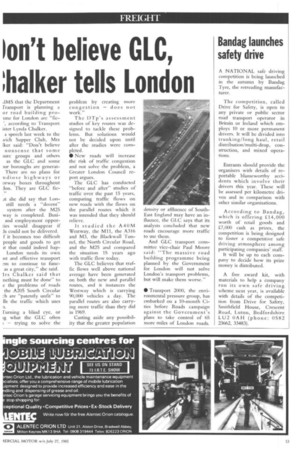lon't believe GLC, :balker tells London
Page 15

If you've noticed an error in this article please click here to report it so we can fix it.
,IMS that the Department fransport is planning a or road building proime for London are "fic', according to Transport ister Lynda Chalker.
a speech last week to the Nich Supper Club, Mrs [ker said: "Don't believe nonsense that some sure groups and others as the GLC and some >Lir boroughs are generatThere are no plans for ndiose highways or orway boxes throughout ion. They are GLC fic
at she did say that Lonstill needs a "decent" system after the M25 way is completed. Busiand employment opporties would disappear if Is could not be delivered. f it becomes too difficult people and goods to get it that could indeed hapLondon needs its own ist and effective transport to continue to funcas a great city," she said. Irs Chalker said that nething must be done" to e the problems of roads the A205 South Circular 211 are "patently unfit" to Ile the traffic which uses a.
rurning a blind eye, or ig what the GLC often ; — trying to solve the problem by creating more congestion — does not work."
The DTp's assessment studies of key routes was designed to tackle these problems. But solutions would not be decided upon until after the studies were completed.
• New roads will increase the risk of traffic congestion and not solve the problem, a Greater London Council report argues.
The GLC has conducted "before and after" studies of traffic over the past 15 years, comparing traffic flows on new roads with the flows on the parallel routes which it was intended that they should relieve.
It studied the A4OM Westway, the M11, the A316 and M3, the illackwall Tunnel, the North Circular Road, and the M25 and compared the situation 15 years ago with traffic flow today.
The GLC believes that traffic flows well above national average have been generated on both the new and parallel routes, and it instances the Westway which is carrying 90,000 vehicles a day. •The parallel routes are also carrying more traffic than they did in 1969.
Casting aside any possibility that the greater population density or affluence of SouthEast England may have an influence, the GLC says that its analysts concluded that new roads encourage more traffic to use them.
And GLC transport committee vice-chair Paul Moore said: "The massive road building programme being planned by the Government for London will not solve London's transport problems, but will make them worse."
• Transport 2000, the environmental pressure group, has embarked on a 10-month Cities before Roads campaign against the Government's plans to take control of 65 more miles of London roads.












































































